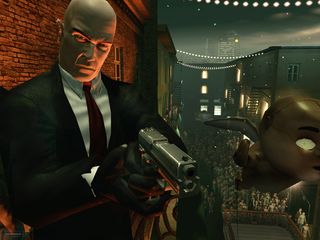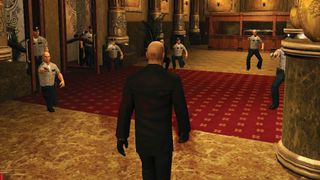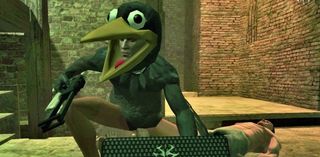I never get tired of Hitman: Blood Money's inventiveness
In this classic feature, Jim Rossignol took a long bath in Blood Money and declared it an excellent puzzle game as well as a stealth one.

We're digging into the PC Gamer archives to publish pieces from years gone by. This article was originally published in 2007.
There's something on my mind. This being a Hitman retrospective, you might think that thing would be murder, but actually it's puzzles. You see, it seems to me that each level of a Hitman game is essentially a giant, evolving puzzle.
This is a game less about the act of taking a life, or the grisly excitement of electronically simulated violence, and more about not causing a commotion in a volatile situation. Murdering a porn baron and his son in their palace, killing a gang of thugs on their Mississippi steamer—these are not your average deathmatch escapades.
Often, all you'll have is a garotte and a syringe—but then quiet strangulation or poisoning is always better than a shotgun. Bombs have their place, but I'd rather use a silenced pistol. Keep things quiet, and the puzzle unravels. Cause upset, and this Rubik's Deathtrap becomes ever more convoluted, until there's no way out.
There are only so many times you can make a wrong move in Agent 47's world, and you can't expect to be able to kill all the guards. But making a wrong move is often the best thing you can do: you see exactly how things come apart, and often collapse your house of cards into a quagmire of slapstick slaughter. Hitman is a game in which the replay isn't simply a denouncement of your failure, but the gradual, careful examination of the possibilities, the parameters of your perfect kill.
Blood Money, above all the other Hitman games, seems to have grasped what it is that makes a good puzzle. Not all of the levels quite hit their mark and some are far too easy, but occasionally there's a glimpse of unmitigated brilliance. Whatever the scenario, they are a toolbox: one in which you must be imaginative.


Blood Money is filled with small jokes, references, and visual cleverness. The beautifully elegant opening screens, for example, show a modern church. The congregation slowly diminishes as the game goes on—look closely and you'll see that they are your victims. Meanwhile on the opera level, the scene you see is from Act 3 of Puccini's masterwork, Tosca—which itself is a mock execution.
Take, for example, the carnival level, in which you must protect a canvassing politician from assassins. Assassins dressed as chickens. You might think they stand out in a crowd but as it happens, Blood Money's crowd—the most realistic I've ever seen in a videogame—is full of folks with chicken hats. It's kind of a carnival theme. Suddenly the puzzle becomes a little trickier. You're faced with getting people alone, in a situation where there are potentially hundreds of witnesses. Best dress as a chicken, eh?
The biggest gaming news, reviews and hardware deals
Keep up to date with the most important stories and the best deals, as picked by the PC Gamer team.
Then there's the sanatorium. There are so many ways into this that the challenge becomes one of monitoring the patients' habits and waiting for the time to strike.
The obvious way in is to simply be admitted as a patient, but you could just as easily pick a lock on a side door, murder a guard, and use his identity to get through the building. Smuggling your agent buddy out of there can be a little tricky, but if it comes to the worst you can usually shoot your way out. Not that you'd want to, of course.

Or how about a visit to the opera? Killing someone on stage doesn't seem like the wisest option, but if you pick up the antique pistol left for you at reception, you'll realise that you can time the shot to coincide with a blank fired in the play.
Blood Money is, like all the great puzzle games, about bettering yourself.
But then how do you kill the second mark when he's still surrounded by bodyguards? There's the sniper option, of course, but once the guy is down, how will you make your escape? One disguise is never quite enough.
As I said, some levels are a little too easy. Here it's up to you to find ways to make them interesting. Take the redneck wedding: you can steal a disguise and an invitation, and kill both the father and the groom, within about a minute. But that's boring.

Would you really be playing the game if you did that? Would you really be an artisan, a master of the puzzle? There are so many options. The remote mine, the wedding present, the dogs, the sniper rifle secreted in nearby buildings...
Blood Money is, like all the great puzzle games, about bettering yourself. You're not just completing the game, you're doing so with style.
Also—as if you needed another reason to go back and dig it out—there is no other game to which, while playing, you can respond to the question "what are you up to?" with the answer: "I'm waiting in the road until the clown comes out of the house. Then I'll strangle him, put on his clothes, and put him in the boot of his own van." At which point your girlfriend leaves your cup of tea and backs away rather too quickly.
Most Popular

